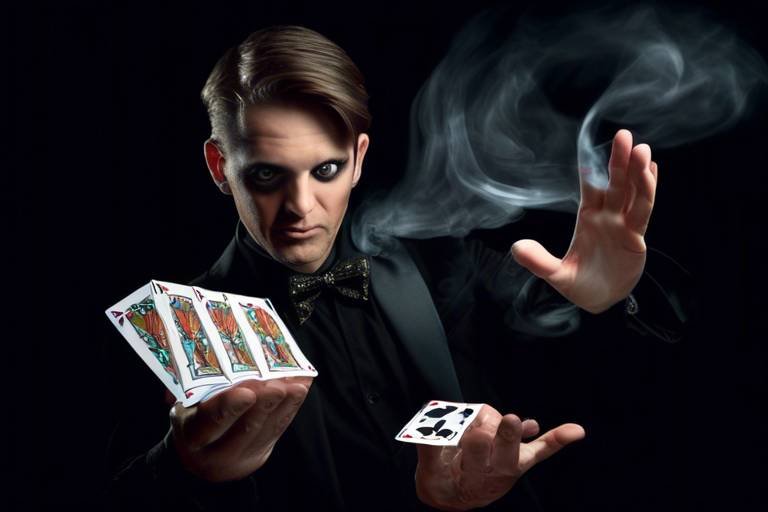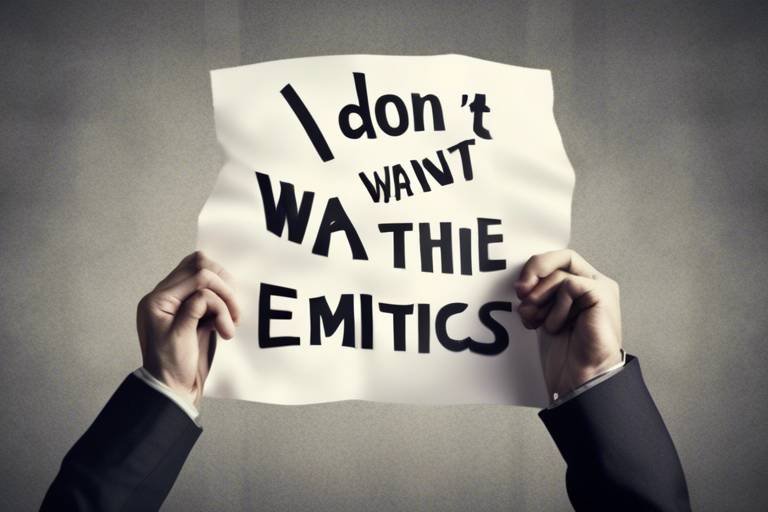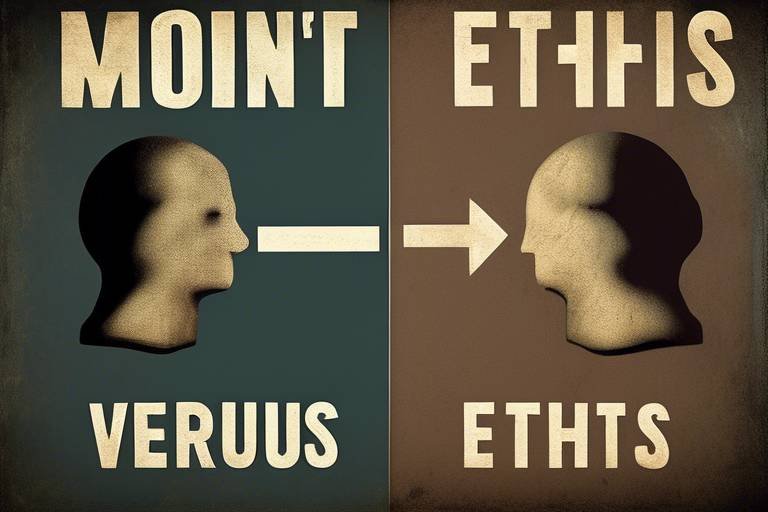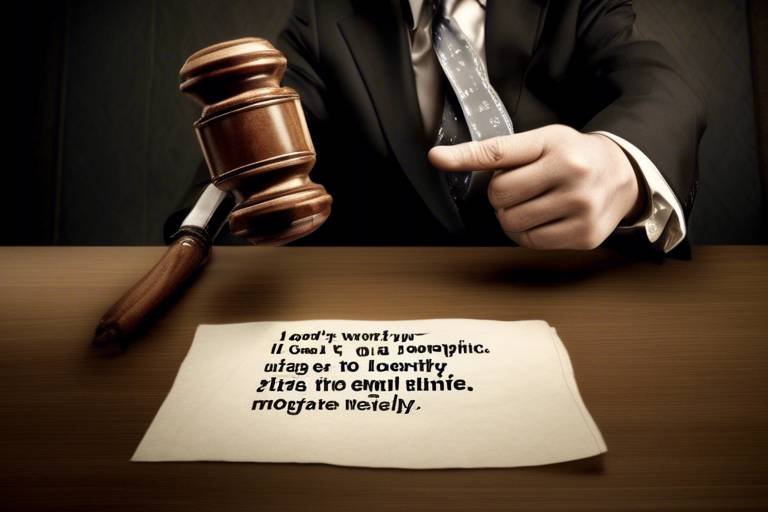Are There Ethics in Magic Tricks?
Magic has always captivated audiences with its enchanting illusions and astonishing feats. But as we dive into the world of magic, a question arises: This inquiry goes beyond the mere performance of tricks; it delves into the responsibilities that magicians hold towards their audience and the ethical dilemmas they face. While magic is fundamentally about deception, the line between entertainment and manipulation can often become blurred. In this article, we will explore the ethical considerations surrounding magic tricks, examining how magicians balance the thrill of illusion with the need for honesty and respect towards their viewers.
At its core, magic relies on the art of deception. Magicians create an experience that defies reality, leaving audiences in awe of what they've witnessed. However, this very deception raises ethical implications. How far is too far when it comes to misleading an audience? While the goal is to entertain, crossing ethical boundaries can lead to a loss of trust. Magicians must navigate this delicate balance carefully, ensuring that their performances are both captivating and respectful of the audience's intelligence. After all, would you want to feel like a fool for being tricked, or would you prefer to be amazed and entertained?
Moreover, magicians have a profound responsibility to their audience. This responsibility goes beyond simply performing tricks; it encompasses respecting the emotions and intellect of those who watch. Transparency plays a crucial role in maintaining this trust. When a magician performs, they should aim to create an environment where the audience feels engaged and respected. By being mindful of their audience's reactions and perceptions, magicians can enhance the overall experience while adhering to ethical standards. It's not just about the trick; it's about the connection forged between the performer and the audience.
Deception is fundamental to magic, but ethical implications arise when audiences are misled. This section examines how magicians balance entertainment with honesty and the potential consequences of crossing ethical boundaries.
Magicians have a duty to respect their audience's intelligence and emotions. This section discusses the importance of transparency and how magicians can maintain trust while still performing astonishing feats.
Informed consent is crucial in magic shows. This subsection explores how magicians can ensure that audiences understand the nature of tricks without revealing secrets, preserving the magic while respecting viewers.
Understanding audience awareness and expectations helps magicians craft their performances. This part delves into how magicians can gauge audience reactions and adapt their acts to maintain ethical standards.
Some audiences may be more susceptible to manipulation. This section highlights the importance of considering vulnerable individuals and how magicians can ethically engage with these groups during performances.
Magicians often face ethical dilemmas, such as whether to reveal secrets or use sensitive material. This subsection discusses common ethical challenges and how magicians navigate these situations.
Magic can influence societal perceptions of reality and trust. This section examines the broader implications of magic tricks on culture, including the potential for misinformation and the responsibility of magicians as entertainers.
In an age of information overload, magic can blur the lines between reality and illusion. This part explores the potential for magic to contribute to misinformation and how magicians can combat this issue.
Magic is often considered an art form that evokes wonder and joy. This section discusses the ethical considerations of artistic expression in magic and the responsibilities that come with it.
- What are the ethical responsibilities of a magician? Magicians have a duty to respect their audience's intelligence and emotions while maintaining transparency in their performances.
- Can magic tricks be considered deceptive? Yes, magic relies on deception, but ethical magicians strive to balance entertainment with respect for their audience.
- How can magicians ensure informed consent? By engaging with the audience and making them aware of the nature of the tricks without revealing secrets, magicians can maintain the magic while respecting viewers.
- What impact does magic have on society? Magic can influence perceptions of reality and trust, and magicians must navigate the potential for misinformation responsibly.

The Role of Deception in Magic
Deception is the very heartbeat of magic; it's what keeps the audience on the edge of their seats, wide-eyed with wonder. But hold on a second! While deception is essential, it also raises some ethical questions that magicians must navigate. How do they ensure that their art remains entertaining without crossing the line into manipulation? It's a fine balance, and many magicians spend years honing their craft to master it.
At its core, magic is about creating illusions. It's about making the impossible seem possible, whether that's pulling a rabbit out of a hat or making someone disappear. However, this art form hinges on the audience's willingness to suspend their disbelief. When a magician performs, the audience knows, at some level, that they are being deceived. Yet, they willingly participate in this deception, craving the thrill that comes with the unexpected. The question then arises: Is it ethical to mislead people, even for entertainment?
Many magicians argue that the deception involved in magic is harmless and, in fact, can be beneficial. After all, it allows people to escape reality for a few moments and indulge in a world where anything is possible. However, the ethical implications become murky when the magician's tricks lead to feelings of betrayal or mistrust. For instance, if a magician uses a trick that plays on a person's vulnerabilities—like a card trick that seems to predict a deeply personal choice—this can lead to discomfort or even emotional distress.
In navigating these waters, magicians often employ a set of unwritten rules that help maintain a healthy balance between entertainment and honesty. Here are some key points to consider:
- Transparency: While magicians should never reveal their secrets, they can still create an atmosphere of trust by being open about the nature of their performance.
- Respect for the Audience: Magicians need to gauge the emotional state of their audience and avoid tricks that could lead to feelings of discomfort or betrayal.
- Ethical Considerations: Some tricks may involve sensitive topics or themes, and magicians should think carefully about the potential impact on their audience.
Ultimately, the role of deception in magic is a double-edged sword. It can create moments of joy and astonishment, but it also has the potential to mislead and confuse. As magicians continue to push the boundaries of their craft, they must remain vigilant about the ethical implications of their work. After all, the goal is to bring joy and wonder to the audience, not to leave them questioning their reality.

Magicians' Responsibilities to Their Audience
When it comes to the world of magic, the relationship between the magician and the audience is a delicate dance of trust and entertainment. Magicians have a profound responsibility to their audience, not just to astound them with mind-boggling illusions, but also to respect their intelligence and emotions. Imagine stepping into a world where the impossible becomes possible; it’s thrilling! But what happens when the line between entertainment and manipulation becomes blurred? This is where ethical considerations come into play.
One of the primary responsibilities of a magician is to ensure that their audience feels respected and valued. This means acknowledging that the audience is not merely a group of passive viewers but rather active participants in the experience. Magicians should strive to create an environment where viewers can suspend disbelief without feeling duped or belittled. It’s all about striking that perfect balance between wonder and respect.
To maintain this balance, magicians can employ various strategies. For instance, they can engage with their audience by asking questions or encouraging them to participate in the performance. This interaction fosters a sense of community and respect, making the audience feel like they are part of something special. Moreover, transparency plays a crucial role in this dynamic. While magicians must keep their secrets to maintain the allure of magic, they can still be open about the nature of their performance. This can involve sharing the idea that what they are presenting is an illusion, thus setting the stage for a more ethical interaction.
Informed consent is another vital aspect of a magician's responsibilities. Audiences should have a clear understanding of what to expect when they enter a magic show. This doesn’t mean revealing the secrets behind the tricks, but rather ensuring that viewers know they are about to witness a performance designed to challenge their perceptions. This can be achieved through effective marketing, clear communication, and even a brief introduction at the start of the show. By doing so, magicians uphold the integrity of their art while respecting the intelligence of their audience.
Furthermore, it’s essential for magicians to consider the emotional state of their audience. Not everyone comes to a magic show in the same frame of mind; some may be dealing with personal struggles or vulnerabilities. A responsible magician will be aware of this and ensure that their performance does not exploit these vulnerabilities. For instance, avoiding tricks that could inadvertently trigger negative emotions or using sensitive material that may not be suitable for all audiences is crucial. Ultimately, respecting the emotional landscape of the audience enhances the overall experience and fosters a deeper connection.
In summary, the responsibilities of magicians to their audience are multifaceted and significant. They must navigate the fine line between entertainment and ethics, ensuring that their performances are not only awe-inspiring but also respectful and inclusive. By fostering trust, promoting informed consent, and being mindful of audience emotions, magicians can create a magical experience that resonates positively with everyone involved. The magic truly lies in the connection between the performer and the audience, and it’s a bond that should be cherished and nurtured.
- What is the primary responsibility of a magician to their audience?
Magicians must respect their audience's intelligence and emotions while providing an entertaining experience. - How can magicians ensure informed consent?
By clearly communicating what to expect from the performance without revealing secrets. - Why is audience interaction important in magic shows?
It fosters a sense of community and respect, enhancing the overall experience for viewers. - How should magicians handle sensitive material?
They should avoid using content that could exploit or negatively impact vulnerable audience members.

Informed Consent in Performance
When it comes to magic, the concept of informed consent might not be the first thing that springs to mind. However, it is a crucial element that underpins the relationship between magicians and their audiences. Informed consent means that audiences should have an understanding of what they are about to experience, even if the specific secrets behind the tricks remain hidden. It’s akin to entering a thrilling amusement park ride; you want to know that it’s safe and that you’re ready for the twists and turns, even if you don’t know exactly what they are.
To ensure informed consent, magicians can adopt various strategies that respect their audience's intelligence while still preserving the mystique of their performance. One effective method is to provide a brief introduction or disclaimer at the beginning of the show. This could include statements like, “What you are about to witness is a series of illusions designed to entertain and amaze. Please suspend your disbelief and enjoy the journey.” Such a statement not only sets the stage for a magical experience but also invites the audience to engage actively without feeling misled.
Moreover, magicians can create an atmosphere of transparency by engaging with the audience during the performance. For instance, they might ask rhetorical questions or make light-hearted comments that encourage spectators to think critically while still being entertained. This approach fosters a sense of trust and allows the audience to feel like they are part of the experience rather than just passive observers. It’s like watching a movie with a friend who keeps nudging you and whispering, “Can you believe that?”—it enhances the enjoyment while keeping you in the loop.
Informed consent also extends to the types of tricks performed. Magicians should be mindful not to use routines that could manipulate or exploit the audience's emotions, especially in sensitive contexts. For example, using themes related to loss or trauma without careful consideration can lead to discomfort or distress among viewers. Therefore, ethical magicians often choose their material thoughtfully, ensuring that it aligns with the audience's expectations and emotional readiness. This is particularly important when performing for vulnerable groups, where the impact of the performance can be significantly heightened.
In conclusion, informed consent in magic is about creating a balance between surprise and transparency. By ensuring that audiences are aware of the nature of the performance, magicians can maintain the enchanting allure of their craft while respecting their spectators. This ethical approach not only enhances the overall experience but also fosters a deeper connection between the magician and the audience, transforming a simple trick into a memorable event that resonates long after the final bow.
- What is informed consent in magic? Informed consent in magic refers to the idea that audiences should have a basic understanding of what they are about to experience, even if the specifics of the tricks are not revealed.
- Why is informed consent important? It helps maintain trust between the magician and the audience, ensuring that viewers feel engaged and respected during the performance.
- How can magicians ensure informed consent? Magicians can provide disclaimers, engage the audience through dialogue, and choose appropriate material that respects emotional boundaries.
- Can informed consent enhance the magic experience? Absolutely! By fostering a sense of trust and transparency, audiences can enjoy the performance more fully and feel like active participants in the magic.

Audience Awareness and Expectations
When it comes to magic, understanding audience awareness and their expectations is crucial for a magician. Imagine stepping into a theater, lights dimmed, anticipation buzzing in the air. The audience is ready to be amazed, but what they expect varies greatly. Some may be looking for a light-hearted show filled with laughs, while others might crave a more profound experience that challenges their perceptions of reality. This is where the magician's skill in reading the room comes into play. By gauging the audience's mood and expectations, a magician can tailor their performance to not only entertain but also to maintain ethical standards.
One of the key elements in this dynamic is the magician's ability to create a connection with the audience. This connection is built on trust; if a magician can engage their viewers, they are more likely to accept the illusions presented to them. However, this trust can be a double-edged sword. If a magician oversteps the bounds of ethical performance, they risk breaking this bond. For instance, using overly sensitive material or exploiting the audience's emotions can lead to discomfort and even backlash. Therefore, it’s essential for magicians to be mindful of their audience’s emotional state and to steer clear of topics that could be deemed inappropriate or offensive.
Furthermore, audience expectations can also be shaped by cultural contexts. Different communities may have varying thresholds for what they find entertaining or acceptable. A magician performing in a family-friendly venue must adjust their act accordingly, ensuring that all age groups can enjoy the experience without feeling alienated or uncomfortable. This adaptability not only enhances the performance but also reinforces the magician's responsibility to respect the diverse backgrounds of their audience.
To navigate this complex landscape, magicians can employ several strategies:
- Pre-Show Engagement: Interacting with the audience before the show can provide valuable insights into their expectations and comfort levels.
- Feedback Mechanisms: Encouraging audience feedback during and after performances can help magicians refine their acts to better suit their viewers.
- Observational Skills: Being observant of non-verbal cues during the performance can help magicians adjust their routines on the fly.
Ultimately, audience awareness and expectations are not just about delivering a good show; they are about fostering a respectful and ethical environment. By prioritizing the audience's experience and being sensitive to their needs, magicians can create a magical atmosphere that resonates deeply while maintaining integrity. After all, the true essence of magic lies not just in the tricks themselves, but in the shared experience between the magician and the audience, where wonder and trust intertwine.

Respecting Vulnerable Audiences
When it comes to magic, the thrill of the trick often lies in the astonishment it brings. However, there's a delicate balance that magicians must maintain, especially when performing for vulnerable audiences—those who may be more susceptible to emotional manipulation or misunderstanding. This responsibility is not just a matter of ethics; it's about ensuring that the wonder of magic does not come at the expense of someone's well-being.
Vulnerable audiences can include children, the elderly, or individuals dealing with mental health challenges. Each group has unique sensitivities and levels of comprehension, which means that a one-size-fits-all approach to magic simply won’t work. For instance, while a child might find a disappearing act thrilling, an elderly person might feel disoriented or confused by the same trick. Magicians must be aware of these differences and tailor their performances accordingly.
To effectively engage with vulnerable audiences, magicians can adopt several strategies:
- Know Your Audience: Before performing, magicians should take time to understand their audience's background, including any potential vulnerabilities. This can help in crafting a performance that is both entertaining and respectful.
- Use Clear Communication: It's essential to communicate clearly and avoid overly complex tricks that might confuse or mislead vulnerable individuals. Simple explanations can help maintain a sense of wonder without crossing ethical lines.
- Be Mindful of Content: Certain themes or tricks might trigger negative emotions or memories for some audience members. Magicians should be cautious about using sensitive material that could cause distress.
Moreover, establishing a rapport with the audience can significantly enhance the experience. When magicians create a safe and welcoming environment, they not only respect their audience but also foster an atmosphere where everyone can enjoy the magic without fear or discomfort. This rapport can be built through simple interactions, such as asking questions or inviting audience participation, which allows individuals to feel included rather than merely spectators.
In essence, respecting vulnerable audiences is about empathy and understanding. By being considerate of their emotional and psychological states, magicians can elevate their performances beyond mere tricks. Instead, they create meaningful experiences that resonate with all audience members, leaving them with a sense of joy rather than confusion or discomfort. The true magic lies not just in the illusion but in the connection forged with the audience.
- What are some signs that an audience might be vulnerable?
Signs can include emotional reactions, confusion, or disengagement during the performance. It's essential for magicians to be observant and responsive to these cues. - How can a magician ensure their tricks are appropriate for all audiences?
By researching their audience beforehand and choosing tricks that are universally appealing and easy to understand, magicians can maintain ethical standards. - What should a magician do if they realize a trick is upsetting someone in the audience?
Magicians should be prepared to adapt their performance on the fly, perhaps by acknowledging the situation and moving on to a different trick that is less distressing.

Ethical Dilemmas in Magic
When it comes to magic, the fine line between entertainment and deception often leads magicians into a maze of ethical dilemmas. One of the most pressing questions is whether magicians should ever reveal their secrets. On one hand, revealing the mechanics behind a trick can demystify the experience for audiences, potentially enhancing their appreciation for the art. On the other hand, it can strip away the wonder and excitement that magic provides. This dilemma is akin to an artist explaining every brushstroke of their painting; it might make the viewer appreciate the skill but could also diminish the magic of the artwork.
Another ethical challenge arises when magicians consider the content of their performances. Some tricks may involve sensitive topics or exploit vulnerable individuals for entertainment. For instance, using themes related to personal loss or trauma can evoke strong emotions, but it also raises the question: is it ethical to use such material for a laugh or a gasp? Magicians must navigate these waters carefully, balancing the need for shock value with the responsibility to respect their audience's experiences.
Moreover, magicians often grapple with the implications of their performances on societal perceptions. In a world where misinformation is rampant, the line between illusion and reality becomes increasingly blurred. A magician's ability to create a convincing illusion could inadvertently lead audiences to question what is real. This raises ethical concerns about the potential for magic to contribute to a culture of deception, where audiences might struggle to discern truth from trickery. As entertainers, magicians have a responsibility to ensure their art does not fuel confusion or mistrust in the world around us.
To tackle these dilemmas, many magicians adopt a set of personal ethics or guidelines. These may include:
- Respecting the emotional boundaries of the audience.
- Avoiding tricks that exploit sensitive topics.
- Choosing not to reveal secrets that would undermine the magic experience.
- Promoting a sense of wonder without misleading the audience about reality.
Ultimately, the ethical dilemmas in magic are complex and multifaceted. Each magician must navigate these challenges based on their values, the context of their performances, and the expectations of their audiences. The art of magic is not just about the tricks; it’s about the connection with the audience and the responsibility that comes with it. As we explore these ethical dimensions, we can appreciate the depth of magic as an art form that entertains while also challenging our perceptions of reality.
Q: Are there specific ethical guidelines that magicians follow?
A: While there are no formal guidelines, many magicians develop personal ethics based on respect for their audience and the integrity of their art.
Q: Is it ever okay for a magician to reveal their secrets?
A: This depends on the context. Some magicians choose to reveal secrets in educational settings or to enhance appreciation, while others believe it diminishes the magic.
Q: How can magic contribute to misinformation?
A: Magic can blur the lines between reality and illusion, leading audiences to question what is true, especially in an age where misinformation is prevalent.
Q: What should a magician consider when performing for vulnerable audiences?
A: Magicians should be mindful of the emotional state and backgrounds of vulnerable audiences, avoiding sensitive topics that could cause distress.

The Impact of Magic on Society
Magic has an undeniable influence on society, shaping our perceptions of reality, trust, and even our understanding of what is possible. It's fascinating to think about how a simple illusion can spark wonder and curiosity, but it also raises important questions about the implications of such experiences. When we watch a magician pull a rabbit out of a hat or make a person disappear, we are not just entertained; we are also challenged to reconsider our beliefs about the world around us.
One of the most significant impacts of magic is its ability to create a sense of wonder and imagination in audiences of all ages. This can lead to a more open-minded perspective on life. Magic encourages people to dream and think outside the box, which can be particularly beneficial in a society that often prioritizes logic and reason over creativity. In this light, magic can be seen as a vital component of cultural expression, promoting innovation and artistic exploration.
However, the impact of magic isn't solely positive. The blurring of reality and illusion can sometimes lead to confusion or even mistrust. In an age where information is readily available, magic has the potential to contribute to the spread of misinformation. When audiences are captivated by a trick, they may not question the validity of what they see, leading to a dangerous acceptance of falsehoods. This is especially relevant in today's digital landscape, where deepfakes and other forms of deception are prevalent. Magicians, therefore, have a responsibility to navigate this fine line carefully.
Furthermore, the ethical implications of magic extend to how it can shape societal norms and values. For instance, some magic tricks rely on stereotypes or cultural clichés, which can perpetuate harmful narratives or reinforce biases. As magicians, being aware of the messages conveyed through their performances is crucial. They must consider whether their art contributes positively to society or if it inadvertently harms certain groups. This self-awareness can help magicians maintain a level of integrity and responsibility in their craft.
To illustrate these points, consider the following table, which summarizes the positive and negative impacts of magic on society:
| Positive Impacts | Negative Impacts |
|---|---|
| Encourages creativity and imagination | Can blur the lines between reality and illusion |
| Promotes cultural expression and innovation | May contribute to the spread of misinformation |
| Creates a sense of wonder and joy | Can reinforce stereotypes and biases |
In conclusion, the impact of magic on society is multifaceted. While it has the power to inspire and entertain, it also carries ethical responsibilities that magicians must acknowledge. As audiences become more discerning, magicians need to adapt their performances to uphold ethical standards while still delivering the awe-inspiring experiences that make magic so captivating. Ultimately, the goal should be to enrich the cultural tapestry of society while ensuring that the illusions we create do not distort our understanding of reality.
- Does magic have a negative impact on society? While magic can contribute to misinformation, it also promotes creativity and cultural expression.
- How can magicians maintain ethical standards? By being aware of their audience and the messages conveyed through their performances, magicians can uphold ethical standards.
- Is magic considered an art form? Yes, magic is often regarded as an art form that evokes wonder and joy, but it comes with ethical responsibilities.

Magic and Misinformation
In today's world, where information is at our fingertips, the allure of magic can sometimes lead to a slippery slope of misinformation. Magic tricks, designed to astonish and entertain, can inadvertently create a sense of mistrust in what we perceive as reality. When a magician performs a stunning illusion, the audience is often left questioning the very fabric of truth. This is where the ethical responsibilities of magicians come into play, as they must navigate the fine line between entertainment and the potential for deception.
Consider this: when a magician pulls a rabbit out of a hat, it’s a delightful surprise, but what happens when that same principle is applied to more serious matters? The skills used in magic can be misappropriated to manipulate public perception, especially in an era where fake news and misinformation run rampant. For instance, a magician's ability to create illusions can be likened to how media can twist facts to fit narratives. Both can leave audiences questioning what is real and what is fabricated.
Magicians, therefore, have a dual role: to entertain and to ensure that their craft does not contribute to the erosion of trust in information. They must ask themselves: How can I entertain without misleading? This is not just about keeping secrets; it’s about being aware of the broader implications of their performances. They should be mindful of the messages they convey and the potential for their tricks to be misinterpreted as truth.
To combat misinformation, magicians can adopt several strategies:
- Transparency: While keeping the secrets of their tricks, magicians can still be open about the fact that what they perform is an illusion. This helps audiences understand that magic is a form of entertainment and not a reflection of reality.
- Education: Some magicians choose to educate their audiences about the principles of magic, explaining how tricks are done without revealing specific secrets. This can foster a greater appreciation for the art while reinforcing the idea that magic is about illusion.
- Ethical Themes: Incorporating themes of ethics and truth into performances can also be effective. By prompting audiences to think critically about what they see, magicians can encourage a more discerning approach to information.
In conclusion, while magic is a beautiful art form that captivates and entertains, it is crucial for magicians to remain vigilant about their influence on societal perceptions. By acknowledging the potential for misinformation and actively choosing to promote trust and transparency, magicians can ensure that their performances contribute positively to the cultural landscape, rather than detracting from it.
- Can magic tricks contribute to misinformation? Yes, magic can blur the lines between reality and illusion, which may lead to misunderstandings about truth.
- How can magicians ensure they don’t mislead their audience? By being transparent about the nature of their tricks and educating audiences on the principles of magic.
- What responsibilities do magicians have towards their audience? They have a duty to respect their audience's intelligence and emotions, ensuring that their performances do not contribute to misinformation.
- Is there a way to incorporate ethical themes in magic? Absolutely! Magicians can weave themes of ethics and truth into their performances to promote critical thinking among audiences.

Magic as a Form of Art
Magic is not just about tricks and illusions; it's a captivating art form that stirs the imagination and evokes a sense of wonder. Much like a painting or a musical composition, magic has the power to transport audiences to a different realm, where the impossible becomes possible. The artistry lies in the magician's ability to weave narratives, create stunning visuals, and engage emotions, all while maintaining an air of mystery. This intricate dance between illusion and reality is what makes magic a unique and powerful medium of expression.
At its core, magic is about storytelling. Each trick unfolds like a chapter in a book, drawing the audience into a world where anything can happen. Whether it's a card trick that leaves spectators scratching their heads or a grand illusion that defies the laws of physics, the magician acts as both narrator and performer. They guide the audience through a journey filled with suspense and surprise, creating an experience that lingers long after the final bow.
However, with great power comes great responsibility. As artists, magicians must navigate the ethical waters of their craft. They have a duty to respect their audience's intelligence and emotions, ensuring that their performances are not only entertaining but also thought-provoking. This is where the ethical considerations of magic as an art form come into play. For example, when a magician chooses to incorporate sensitive themes or personal stories into their act, they must do so with care, ensuring that the impact is positive and respectful.
Moreover, the artistry in magic is also reflected in the presentation. From the magician's choice of attire to the ambiance of the performance space, every detail contributes to the overall experience. A well-crafted magic show is like a beautifully staged play, where lighting, music, and props come together to create a mesmerizing atmosphere. This holistic approach not only enhances the illusion but also elevates magic to a true art form.
In this context, the magician's role transcends mere entertainment. They become creators of wonder, challenging perceptions and inviting audiences to question what they believe to be true. The ethical implications of this role are profound, as magicians wield the power to shape beliefs and influence emotions. As such, they must be mindful of the messages they convey and the potential impact on their audience.
In conclusion, magic as a form of art is a delicate balance of creativity, ethics, and audience engagement. It invites us to explore the boundaries of reality while reminding us of the importance of trust and respect. As magicians continue to evolve their craft, they must remain vigilant in upholding the ethical standards that not only protect their art but also enrich the experiences of those who witness their enchanting performances.
- What is the ethical responsibility of a magician? Magicians have the responsibility to respect their audience's intelligence and emotions, ensuring their performances are entertaining yet honest.
- How can magic influence societal perceptions? Magic can blur the lines between reality and illusion, potentially contributing to misinformation if not approached ethically.
- Is magic considered an art form? Yes, magic is recognized as an art form that combines storytelling, creativity, and performance to evoke wonder and joy.
- What are some common ethical dilemmas faced by magicians? Common dilemmas include whether to reveal secrets, using sensitive material, and ensuring informed consent from the audience.
Frequently Asked Questions
- What are the ethical responsibilities of a magician?
Magicians have a responsibility to entertain while respecting their audience's intelligence and emotions. This means being mindful of how tricks are presented and ensuring that the audience is not misled in a harmful way. A good magician balances the thrill of deception with honesty, creating an experience that is both enchanting and respectful.
- How do magicians ensure informed consent during performances?
Informed consent is vital in magic shows. Magicians can ensure audiences understand they are witnessing illusions without revealing the secrets behind the tricks. This can be done through clear communication before the show, emphasizing that what they are about to see is a performance designed to amaze, while keeping the actual methods a mystery.
- What should magicians consider when performing for vulnerable audiences?
When performing for vulnerable audiences, such as children or individuals with certain psychological conditions, magicians should be particularly careful. It's important to avoid tricks that could be emotionally distressing or manipulative. Ethical magicians will adapt their performances to ensure that everyone feels safe and included, thus preserving the joy of magic without crossing ethical boundaries.
- Can magic tricks contribute to misinformation?
Yes, magic tricks can blur the lines between reality and illusion, which may inadvertently contribute to misinformation. In a world where information is abundant, magicians have a duty to be aware of how their performances can affect societal perceptions. They can combat this by being transparent about the nature of their acts and encouraging critical thinking among their audiences.
- Is magic considered an art form?
Absolutely! Magic is often regarded as a unique art form that evokes wonder and joy. Like all art, it comes with ethical considerations, particularly regarding how it influences emotions and perceptions. Magicians must navigate these responsibilities carefully, ensuring their performances uplift and inspire rather than deceive or manipulate.



















